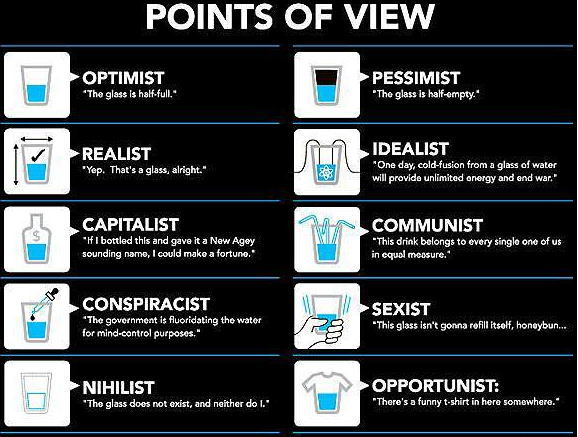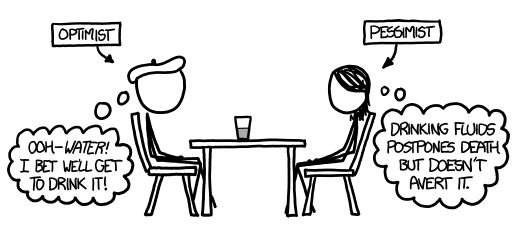
Image from: https://philosophersforchange.org/2012/06/05/philosophy-as-critique-and-ideology/.
There are three common perspectives that people take on the world: optimism, pessimism, and realism. Of course, people are rarely ever strictly one thing, and will experience a mix of worldviews depending on their day and major life events.
Why does it matter how we frame the water in the glass? The water remains the same amount whether it is half full or half empty.

Image from: https://www.quora.com/What-if-the-glass-was-quite-literally-half-empty.
It matters because my ability to drink all the water in the glass is contingent on my belief that I can or cannot drink it all. If I see the glass as already half empty, I’m less aware of how much I will have to drink. If I see it as half full, I’m focusing on the huge amount of work left to be done.
On a larger scale, if I frame the future of the world and the Anthropocene (our age of human impact) as optimistically improving, I’m ignoring the problems we have to face and running the danger of putting off action until it is too late. If I only see pessimistically, then my problems dwarf me, make my efforts insignificant and drown out my hope and willingness to act. What’s the point of being part of the world if it’s only getting worse?
This is why I think it’s essential not to separate the two halves of the glass, but to instead take a step back and realize that the glass, and the current condition of the world, are what they are. The future is something I can never be sure of, but the present is a fact. The actions I take now contribute to the whole Earth System, as I am emphatically and unconditionally connected to the world. I don’t want to let myself be blinded by what I want or inhibited by what I am afraid of.
The most important lesson we can take from a class about awareness is that only by accepting a broader view based on reality can we begin to take steps to affect the future. That is what our readings are setting us up for, whether they focus on empathy and connectivity (Jeremy Rifkin’s Empathic Civilization), the economy and utilitarianism (David Loy’s Religion of the Marketplace), or science and power (Evelyn Fox Keller’s Dynamic Objectivity), all of the readings are asking us to take another look at how we interact with the world, and to choose a viewpoint that allows us to make a more positive impact.

